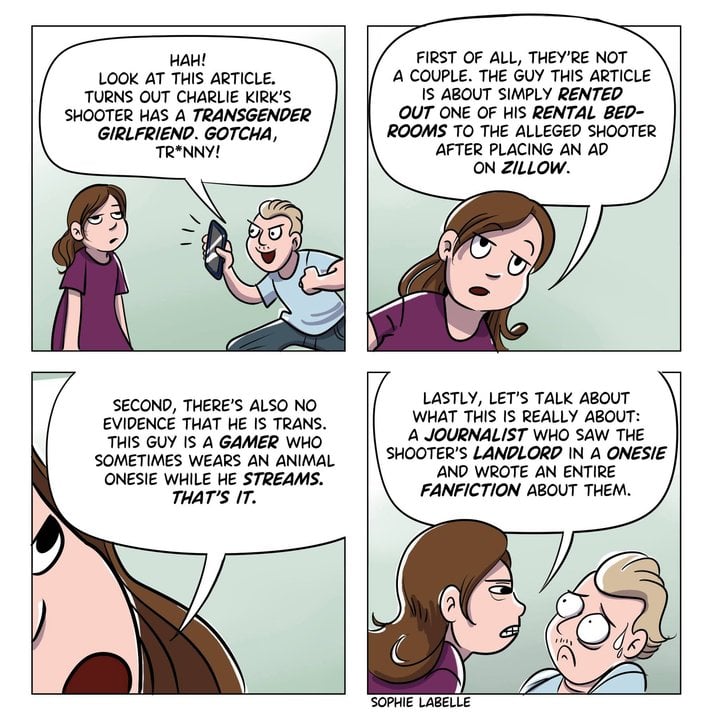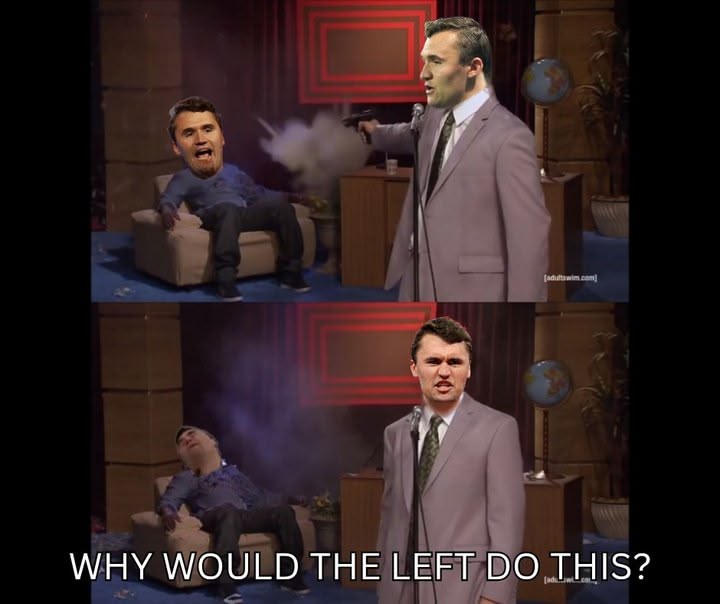How Charlie Kirk helped create the culture who would laugh at his death
This link is for premium members but I asked chat gpt to sum up basic ideas as I had a feeling to what it's alluding to but basically Charlie being mocked is his own creation.
https://slate.com/news-and-politics/2025/09/charlie-kirk-shooting-memes-political-violence.html
1. Kirk as an architect of performative conflict
Charlie Kirk and Turning Point USA were central in building a politics-as-spectacle model aimed especially at younger audiences — social media virality, aggressive debate tactics, “red-meat” rhetoric, and constant provocation.
That strategy often rewarded outrage, trolling, and polarizing statements, rather than nuanced argument or civil discourse.
2. Weaponizing mockery and dehumanization
Part of Kirk’s approach relied heavily on mocking opponents — labeling them as weak, un-American, or morally inferior, often in very blunt, dismissive, or ridiculing ways.
Critics have argued that this contributes to a broader cultural shift: disagreement becomes dehumanization, opponents become “villains” to be humiliated, not people to engage with.
3. Blurring the line between digital trolling and real-world violence
In the digital age, political communication often features “meme warfare,” trolling on steroids, and viral call-outs. Slate likely argued that Kirk’s branding leaned into that: politics as entertainment, with winners and losers, sound bites and dunking, rather than steady persuasion or coalition-building.
This isn’t necessarily violence in itself, but it can de-escalate the taboo on hostile language, on public mockery, or on stoking fear and anger. That can prime the culture to respond to extreme events — even a murder — with reflexive skepticism, schadenfreude, or violent humor.
4. A feedback loop: outrage, reaction, escalation
Once activists and media personalities like Kirk model a style of politics that prizes outrage, viral mockery, and “owning the libs” over respect or caution, the rest of the political ecosystem can respond in kind.
So if an event like a shooting happens, the framing sometimes slips immediately into "well-deserved" or “he asked for it” territory — especially from people who feel attacked by Kirk’s rhetoric in the past.
That cultural shift in how we react to tragedy might start with the speaker himself.
5. Not a moral equivalence, but a warning
From what I gather, Slate isn’t saying “Charlie Kirk deserved to die” (at least, not responsibly). Rather, it's probably issuing a caution: if you build a political brand on constant provocation and dehumanization, you shouldn't be surprised when reactions escalate beyond mere insults or memes. And when violence enters the picture, people’s reflex to mock or minimize (especially if they've been conditioned to see each other as enemies, not interlocutors) becomes more socially plausible.
https://slate.com/news-and-politics/2025/09/charlie-kirk-shooting-memes-political-violence.html
1. Kirk as an architect of performative conflict
Charlie Kirk and Turning Point USA were central in building a politics-as-spectacle model aimed especially at younger audiences — social media virality, aggressive debate tactics, “red-meat” rhetoric, and constant provocation.
That strategy often rewarded outrage, trolling, and polarizing statements, rather than nuanced argument or civil discourse.
2. Weaponizing mockery and dehumanization
Part of Kirk’s approach relied heavily on mocking opponents — labeling them as weak, un-American, or morally inferior, often in very blunt, dismissive, or ridiculing ways.
Critics have argued that this contributes to a broader cultural shift: disagreement becomes dehumanization, opponents become “villains” to be humiliated, not people to engage with.
3. Blurring the line between digital trolling and real-world violence
In the digital age, political communication often features “meme warfare,” trolling on steroids, and viral call-outs. Slate likely argued that Kirk’s branding leaned into that: politics as entertainment, with winners and losers, sound bites and dunking, rather than steady persuasion or coalition-building.
This isn’t necessarily violence in itself, but it can de-escalate the taboo on hostile language, on public mockery, or on stoking fear and anger. That can prime the culture to respond to extreme events — even a murder — with reflexive skepticism, schadenfreude, or violent humor.
4. A feedback loop: outrage, reaction, escalation
Once activists and media personalities like Kirk model a style of politics that prizes outrage, viral mockery, and “owning the libs” over respect or caution, the rest of the political ecosystem can respond in kind.
So if an event like a shooting happens, the framing sometimes slips immediately into "well-deserved" or “he asked for it” territory — especially from people who feel attacked by Kirk’s rhetoric in the past.
That cultural shift in how we react to tragedy might start with the speaker himself.
5. Not a moral equivalence, but a warning
From what I gather, Slate isn’t saying “Charlie Kirk deserved to die” (at least, not responsibly). Rather, it's probably issuing a caution: if you build a political brand on constant provocation and dehumanization, you shouldn't be surprised when reactions escalate beyond mere insults or memes. And when violence enters the picture, people’s reflex to mock or minimize (especially if they've been conditioned to see each other as enemies, not interlocutors) becomes more socially plausible.












